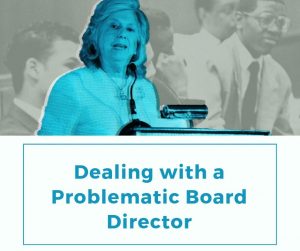Dealing with a Problematic Board Director

In 2014, the #ExeronatedFive (nee: #CentralParkFive) received a multi-million dollar settlement from the State of New York for their wrongful conviction and imprisonment related to the case of the rape and battery of Trisha Meili. Linda Fairstein, the prosecutor in the case, has come under fire in 2019 following the success of Ava DuVernay’s film, When They See Us, which dramatizes the events leading up to and following the nationally recognized case. Since the release of the film, Fairstein has been criticized for her role in the false imprisonment of the five teenagers. Between 1989 and 2019, Fairstein has realized significant financial success as an author and has sat on many boards, including Safe Horizon victims services agency, God’s Love We Deliver, Joyful Heart Foundation, and Vassar College. Now that the film is a part of current popular culture and Fairstein’s actions are being examined with new eyes, she has been forced to resign from these boards.
What is an organization’s duty to ensure board directors do not bring negative attention to the organization due to the past actions of current board directors? First, an organization should fully vet new board directors who are invited to join the board. Before recruiting new board directors, the nominating committee should identify the characteristics they seek in new board directors. Potential board directors should be interviewed and asked about their past roles and experiences. The nominating committee can also do a quick Google search of the potential candidates to determine if they have behaved in a way that would bring negative attention to the organization. After the settlement was issued in 2014, every board in which Fairstein was a member should have evaluated whether or not her presence on their board would negatively impact the organization.
After it has been established that a current board director has behaved in a way that would negatively impact the organization, it is the duty of the board chair to take swift action. This action would include a conversation with the executive committee of the board as well as the errant board director to discuss next steps, including immediate removal of the board director or encouragement of the board director to step down.
Last, it is the duty of the organization to recognize the oversight and communicate the remedy. In the case of Vassar, the Office of the President issued a statement explaining that Fairstein chose to step down from the board in order to not bring further harm to the college.
A board director’s duty of loyalty means that the board of directors must be loyal to the company and its shareholders and act in their best interest. If a board director is bringing negative attention to the organization, it is the responsibility of the board to take measures to protect the organization, and remove the problem board director.
For more information on board governance and board diversity, follow along on Twitter or Instagram. Nikki McCord is the founder of McCord Consulting Group, the only choice for organizations looking to energize, innovate, and diversify their Board of Directors.
